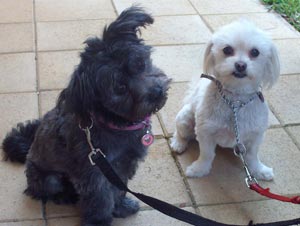Obedience Training
Most people think about dog and puppy obedience training as group dog coaching classes in a park or at a club. We picture early Saturday or Sunday morning classes with people making their pooch walk beside them and learning tricks and commands. Teaching obedience for the sake of obedience. This appears to be more for the owner who wants to see their pooch move up the ladder of the group or club. Many people enjoy that and it can be a good thing as long it’s positive coaching and they teach people not to hit their pooch.
Obedience Dog Training

Obedience training is often thought of as group session in a park on a weekend morning. This often produces limited results. When the dog returns home the lessons aren’t transferred to the house. The dog doesn’t learn the proper hierarchy of the family pack at home
despite being well behaved in the park.
Wesley Laird’s approach to obedience training focuses on private sessions where obedience is used as one of the tools to get respect for every member of the family. In Home Dog Training teaches you how to be a better owner by understanding your dog’s psychology and showing you how to use this knowledge to maintain respect, obedience and discipline over your dog, in very positive and loving ways.
Until recently there were only two kinds of obedience teaching, group education and kennel working.
Group training: Where one family member takes the canine to the park or club. Many canine are trained at a park but have problems at home. All canine need to know that everyone they live with is above them in the hierarchy of their pack. They don’t just have one master.
Kennel Training: Where people send their best friend to a kennel to be trained. Any good trainer can get a pup’s respect but that does not mean that respect goes home with the best friend.
With Wesley Laird’s In Home Dog Training in Melbourne , he teaches private lessons where the pup lives to all family members. Using obedience education teaching you learn to be a good consistent pack leader, demanding more from your pup, and incorporating consistent approval and disapproval. We can build up both confidence and respect. We can then use that respect for communication and behavioral modifications.
